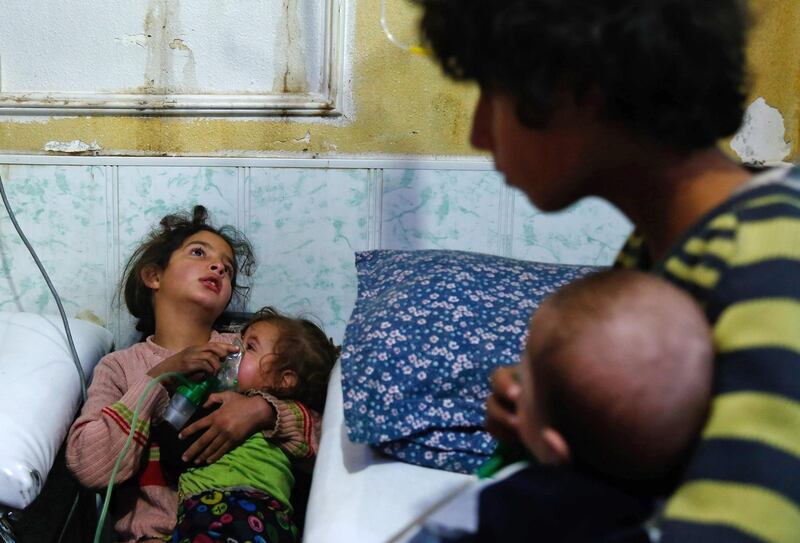Less than a week after the Trump administration floated a military option in response to chemical weapons use in Syria, Nikki Haley, the US ambassador to the United Nations, slammed Russia and its “whitewashing” attempts on behalf of the Assad regime and its alleged use of such weapons.
Calling what is happening in Syria “a true tragedy”, and citing a “troubling pattern” with the latest news on Sunday of “victims of what appears to be chlorine gas are pouring into hospitals”, Ms Haley said that Russia was covering up for the Syrian government.
Speaking at a UN Security Council briefing on Monday, she said that Russia “wants to be able to cherry-pick the [UN] investigators ... to insert unnecessary and arbitrary investigative standards. This is not an impartial mechanism. It is a way to whitewash the findings of the last investigation that Russia desperately wants to bury.”
Ms Haley said "Russia has delayed the adoption of this statement, a simple condemnation of Syrian children being suffocated by chlorine gas", and identified them as the "one country [that] protects the Assad regime's use of chemical weapons by refusing to hold them responsible."
But her Russian counterpart, Vassily Nebenzia, rejected the accusations, calling them a “slander against Russia.” He urged “due investigation of all the attacks” to find out who is responsible.
Since 2012, there have been at least 130 separate chemical weapons attacks in Syria, according to French estimates, and the US state department has referenced six attacks using chlorine gas in January alone.
On Sunday, the Syrian American Medical Society (Sams) reported that hospitals in the town of Saraqeb in Idlib province treated 11 patients for chlorine gas poisoning.
Nicholas Heras, fellow at the Center for a New American Security, told The National that the increased reported use of chlorine gas by the Assad forces is because "the Assad government has made the calculation that there is a threshold under which it can maintain chemical weapons use and not face consequences."
The threshold “is the use of mustard and chlorine gas, with limited application of nerve agents,” he said.
Speaking to reporters on Friday, defense secretary James Mattis appeared to differentiate between the use of chlorine and sarin gases in Syria.
“We are even more concerned about the possibility of sarin use, [but] I don’t have the evidence,” Mr Mattis said. “What I am saying is that other groups on the ground – NGOs, fighters on the ground – have said that sarin has been used, so we are looking for evidence.”
Mr Heras said that the Trump administration “does seem to be making a distinction in its response to chlorine versus other agents, even if in rhetoric it decries the use of all chemical weapons by the Assad government.”
He warned, however, that “inaction by the Trump team on President Bashar Al Assad’s use of chlorine gas sends the signal that the United States has no interest in punishing the regime for the majority of its chemical weapons violations”, and “it tempts Assad to keep on using them until the last opposition controlled areas are snuffed out.”
On Thursday, a White House official said the US “reserves the right to use military force to prevent or deter the use of chemical weapons.”
The use of chemical weapons in Syria is a violation of a 2013 UN Security Council resolution, and undermines a US-Russian agreement from 2013 that claims the Assad government has destroyed its chemical weapons stockpile.
Late on Monday the US state department released a statement expressing “grave alarm” at continued allegations “of the use of chlorine gas by the Syrian regime to terrorise innocent civilians, this time in Idlib Province near Saraqib.”
The US said this is “the sixth such reported instance in the past 30 days in Syria” urging “the international community to speak with one voice, taking every opportunity to publicly pressure the Assad regime, and its supporters, to cease its use of chemical weapons and hold those responsible accountable for these brutal attacks.”






